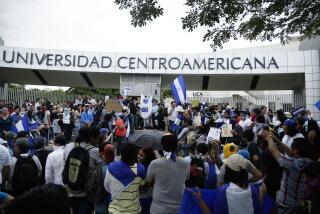Shultz Likens Nicaragua and Vietnam : Says Failure to Help Could Bring Results as in Asian Pullout
- Share via
WASHINGTON — Secretary of State George P. Shultz, drawing the Administration’s tightest parallel yet between Vietnam and Nicaragua, today warned that U.S. failure to continue fighting communism in Central America could lead to the same results as the U.S. pullout from Vietnam.
The secretary, pleading for a renewed congressional commitment to the Administration’s support for guerrillas battling the leftist regime in Managua, said of the Sandinistas:
“Like the Vietnamese communists, they have become a threat to their neighbors.”
In a speech to State Department employees commemorating next week’s 10th anniversary of the fall of South Vietnam, Shultz read this litany:
‘Near Our Borders’
“Broken promises. Communist dictatorship. Refugees. Widened Soviet influence. This time near our very borders.
“Here is your parallel between Vietnam and Central America.”
The secretary asserted that the Sandinista government in Nicaragua bears great resemblance to the government of then-North Vietnam.
“We left Indochina in 1975, but the cost of failure was high,” he said.
“Vietnam--and Watergate--left a legacy of congressional restrictions on presidential flexibility, now embedded in our legislation. . . . These weakened the ability of the President to act and to conduct foreign policy and they weakened our country,” he said.
Shultz said the contra rebels for whom President Reagan has been unsuccessfully seeking $14 million in aid from Congress “deserve our support.”
Face Similar Fate
“They are struggling to prevent the consolidation and expansion of communist power on our doorstep, and to save the people of Nicaragua from the fate of the people of Cuba, of South Vietnam, Cambodia and Laos.
“Those who assure us that these dire consequences are not in prospect are some of those who assured us of the same in Indochina before 1975,” he said.
Shultz, decrying a U.S. pullback from global leadership after Vietnam, asserted:
“Our retreat created a vacuum that was exploited by our adversaries. The Soviets . . . took advantage of our inhibitions and projected their power to unprecedented lengths.”
Shultz noted that Reagan “has called our effort (in Vietnam) a noble cause, and he was right. Whatever mistakes in how the war was fought, whatever one’s view of the strategic rationale for our intervention, the morality of our effort must now be clear.”
More to Read
Sign up for Essential California
The most important California stories and recommendations in your inbox every morning.
You may occasionally receive promotional content from the Los Angeles Times.












